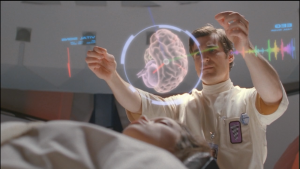Psychic and Sci-Fi: Why the connection?
- January 5th, 2015
- Posted in Opinion/Analysis
- Write comment
 So, after the abysmal premiere of a certain recent miniseries, people’s reactions to the various twists seemed to suggest a question was forming in the minds of sci-fi fans everywhere: why, exactly, are psychic or telekinetic powers considered to be an acceptable plot device in sci-fi? It’s certainly a divergence from most of the other tropes of sci-fi. After all, one of the ground rules that separates sci-fi from fantasy is “technical possibility.” We believe aliens could exist; we believe Artificial Intelligences are possible; traveling through the stars in massive spaceships? Well, we’re already halfway there. Sure, the execution isn’t always terribly realistic, but those are generally concessions to storytelling than deliberate breaks from reality. Star Trek‘s aliens mostly look like humans because Star Trek is a TV show and the characters have to be played by human actors (at least, until very recently with CGI). Psychic powers are the one exception that’s still often considered to be part of the sci-fi writers’ workbag–so why?
So, after the abysmal premiere of a certain recent miniseries, people’s reactions to the various twists seemed to suggest a question was forming in the minds of sci-fi fans everywhere: why, exactly, are psychic or telekinetic powers considered to be an acceptable plot device in sci-fi? It’s certainly a divergence from most of the other tropes of sci-fi. After all, one of the ground rules that separates sci-fi from fantasy is “technical possibility.” We believe aliens could exist; we believe Artificial Intelligences are possible; traveling through the stars in massive spaceships? Well, we’re already halfway there. Sure, the execution isn’t always terribly realistic, but those are generally concessions to storytelling than deliberate breaks from reality. Star Trek‘s aliens mostly look like humans because Star Trek is a TV show and the characters have to be played by human actors (at least, until very recently with CGI). Psychic powers are the one exception that’s still often considered to be part of the sci-fi writers’ workbag–so why?
The simple answer is the obvious one: once upon a time, psychic powers WERE considered a technical possibility. It sounds ludicrous today, but it goes all the way back to the original John Carter of Mars series from the 1800s. But the modern sci-fi tropes were first codified in the days of pulp SF in the 1930s to 1950s, and that includes psychic powers. E.E. Doc Smith’s Lensman series is one of the first space operas, and centered around “The Lens of Civilization” which could grant psychic abilities. The basic idea behind this kind of thing in pulp SF was essentially that the development of psychic abilities in humans was an evolutionary inevitability; keep in mind that this was at a time when even famous psychologists (like certain interpretations of Jung’s “collective unconscious”) considered it a possibility.
In Star Trek‘s case, being produced originally in the 1960’s means that psychics have been there since day one. The second pilot, “Where No Man Has Gone Before,” deals extensively with the “evolutionary” development of psychic powers in humans, and Kirk’s good friend Gary Mitchell begins manifesting those powers upon exposure to the Galactic Barrier. And while psychic powers in actual humans are something that more or less disappeared after TOS (with a few exceptions), it continued to surface in alien species, like the Vulcans and their touch-telepathy, or the telepathic/empathic abilities of the Betazoids, as seen in Counselor Troi, and that’s not even getting into technological telepathy like the Borg. In this case, it makes sense; those psychic abilities were already a part of that world, so it would be a waste not to make use of them in future series. But other sci-fi shows, much more modern shows, continue to make use of psychic abilities, even though they’ve been thoroughly discredited and they’re not bound by old continuity the way that long runners like Star Trek and Doctor Who are. Why is it allowed to persist?
To some extent, it’s the influence of these long runners. They’re still around, and still popular, and so as part of the attempt to emulate them, psychic abilities are brought into the plot. If anyone questions it, then you can point to them as precedent. Occasionally, it’s mentioned or implied how strange it is; Firefly makes it clear that, if not the very first, only an incredibly small group has ever displayed any kind of psychic ability like River’s. It’s why she’s so valuable to the Alliance and the major plot point of Serenity. For a show that otherwise strove for realism, with no faster-than-light or sentient aliens or anything else, the psychic powers absolutely stood out as a weird point.
Mostly, psychic powers tend to persevere in spite of how tired the trope is in sci-fi because they’re just so darn useful from a plot perspective. Can’t communicate with the various aliens around you? A telepathic field connecting the two of you and enabling you to understand each other, like that employed in Doctor Who, comes in handy. Telepathic or telekinetic abilities also stand out as a great way to make your aliens more “alien.” There’s nothing like that anywhere on Earth, so clearly they operate on very different rules of evolution, like the Vulcans of Star Trek. It can also be used to make the enemy seem even more powerful and dangerous. How do you defeat someone who can read your mind, who can tell what you’re doing before you do it? You can’t resist telepathic interrogation, like that performed in Babylon 5 by the Psi Corps. It can even be used as a way to defeat certain otherwise-immutable physical rules, like information traveling beyond the speed of light (as also seen in Babylon 5). And it can be hard for a writer interested in milking all the drama he can to dismiss the allure of premonitions or precognition, which allow for all kinds of fretting over the future or complicated fake-outs that would otherwise have been fulfilled with prophecy in a fantasy tale. Which boils it down to one specific reason: psychic powers are basically the SF equivalent of magic.
Another way that this has been dealt with in more recent series is by moving the burden of proof from biology to technology. That is, rather than having psychic powers be a direct evolutionary or natural state, the psychic abilities in question are generated by technology that simply functions in a way that’s equivalent, story-wise, to psychic powers. Cyborg characters, for example, might communicate with each other via radio signals, rather than speaking, in what is essentially telepathy (the basis behind the Borg hive mind). In one episode of Voyager, Seven of Nine is hit with stray memories of other Borg, left behind by the latent communications that are ever-present for drones. If you delete the fact that she’s a Borg from the script, it could just as easily be psychic visions instead. This gets particularly interesting for Star Trek when characters with legitimate psychic abilities are assimilated, like Tuvok, who finds the experience particularly difficult as a result. Nanotechnology might also fill this role, allowing characters to act invisibly on objects from afar.
This all basically comes down to an application of Clarke’s Third Law, “sufficiently advanced technology is indistinguishable from magic.” Technology used to replicate the end result of psychic powers is, from a story standpoint, indistinguishable from actually using psychic powers. Whether this is an advancement of the genre by leaving the idea of psychic evolution behind or just another way of dressing it up with the latest buzzwords (in much the same way as Spiderman’s radioactive spider bite turning into a genetically engineered spider bite) is up to the reader. I personally prefer a technological explanation to be given, even if it’s a weak one.
How do you feel about psychic powers cropping up in science fiction? Do they break the suspension of disbelief, or are they just another imaginative trope to add to the story? Does technology help to make it more plausible? Let me know in the comments, or you can strike up a conversation on twitter by messaging me @RetroPhaseShift. Next week will see the return of the Obscure SF Primer!







I feel that the use of psychic powers in scifi is just as natural as having elves in middle earth. I think Kes from Star Trek: Voyager did a great job of depicting how psychic abilities may develop over time in a person with training. I mean the years it takes for a Jedi to train and they still don’t know the full extent of the Force.
Just another imaginative trope to the story honestly, but that is just my opinion because a psychic is now a more universal role.
Yes, technology does help make it more plausible but there are some drawbacks. Like someone with implants can’t be read or are immune to telepathic probes. In the end, though I guess it really depends on the writer.